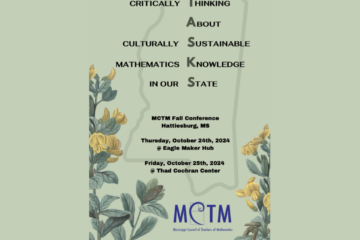Developing our Relationship with the Teaching of Mathematics
What is your relationship status with mathematics?
A productive way for me to think about how best to teach mathematics is to consider facilitating a relationship between a student and mathematics. What are things that I can do to improve the relationship? And how can I avoid damaging the relationship or prevent damage to the relationship? Further, as a teacher of teachers of mathematics (i.e. mathematics teacher educator) what can I do to improve the relationship my students have with mathematics and with the teaching of mathematics.
At the Mississippi Association of Mathematics Teacher Educators Annual Symposium, I had a chance to share some of the things I have learned about teaching mathematics with, about, and for social justice, or teaching with a focus on promoting equity within the mathematics classroom. I made the argument that in developing our (mathematics teacher educators) own relationship with the teaching of mathematics towards promoting equity in the mathematics classroom, we can advance our stance and strategies in teaching mathematics, which we can then impart to those that we teach in our methods classrooms.
Below is a list of books that I mentioned within the presentation that can be used to develop a relationship with the teaching of mathematics; learn how to better teach mathematics with, about, and for social justice. Also below is a link and citation to the slides for my presentation.
Boaler, J. (2015). Mathematical mindsets: Unleashing students’ potential through creative math, inspiring messages and innovative teaching. John Wiley & Sons.
Carpenter, T. P., Fennema, E., Franke, M. L., Levi, L., & Empson, S. B. (2014). Children’s Mathematics: Cognitively Guided Instruction (2nd ed.). Portsmouth, NH: Heinemann.
Featherston, H., Crespo, S., Jilk, L., Oslund, J., Parks, A., & Wood, M. (2011). Smarter together! Collaboration and equity in the elementary math classroom. Reston, VA: NCTM.
Freire, P. (1970). Pedagogy of the oppressed. (30th Anniv). New York: Continuum.
Gutstein, E. (2006). Reading and writing the world with mathematics: Toward a pedagogy for social justice. New York: Routledge.
Gutstein, E., & Peterson, B. (Eds.). (2005). Rethinking mathematics: Teaching social justice by the numbers. Milwaukee, WI: Rethinking Schools, Ltd.
Hill, M. L., & Petchauer, E. (Eds.). (2013). Schooling hip hop: Expanding hip-hop based education across the curriculum. New York: Teachers College Press.
Horn, L. S. (2012). Strength in Numbers: Collaborative Learning in Secondary Mathematics. Reston, VA: NCTM.
Ladson-Billings, G. (1994). The Dreamkeepers: Successful teachers of african american children. San Francisco, CA: Jossey-Bass.
Lampert, M. (2001). Teaching problems and the problems of teaching. New Haven and London: Yale University Press.
Moses, R. P., & Cobb, C. E. (2001). Radical equations : Math literacy and civil rights. Boston: Beacon Press.
Paris, D., & Alim, H. S. (Eds.). (2017). Culturally sustaining pedagogies: Teaching and learning for justice in a changing world. Teachers College Press.
Amidon, J. (May, 2019). Develop the relationship with the teaching of mathematics: Teaching mathematics methods with, about, and for social justice. Talk at Mississippi Association of Mathematics Teacher Educations Annual Symposium. Hattiesburg, MS.


